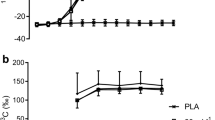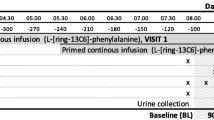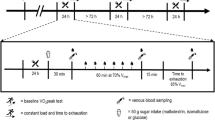Summary
The purpose of this study was to examine the effects of pre-exercise glucose and fructose feedings on muscle glycogen utilization during exercise in six well-trained runners (\(\dot V_{{\text{O}}_{{\text{2 max}}} } \)=68.2±3.4 ml·kg−1·min−1). On three separate occasions, the runners performed a 30 min treadmill run at 70%\(\dot V_{{\text{O}}_{{\text{2 max}}} } \). Thirty minutes prior to exercise each runner ingested 75 g of glucose (trial G), 75 g of fructose (trial F) or 150 ml of a sweetened placebo (trial C). During exercise, no differences were observed between any of the trials for oxygen uptake, heart rate or perceived exertion. Serum glucose levels were elevated as a result of the glucose feeding (P<0.05) reaching peak levels at 30 min post-feeding (7.90±0.24 mmol·l−1). With the onset of exercise, glucose levels dropped to a low of 5.89±0.85 mmol·l−1 at 15 min of exercise in trial G. Serum glucose levels in trials F and C averaged 6.21±0.31 mmol·l−1 and 5.95±0.23 mmol·l−1 respectively, and were not significantly different (P<0.05). There were also no differences in serum glucose levels between any of the trials at 15 and 30 min of exercise. Muscle glycogen utilization in the first 15 min of exercise was similar in trial C (18.8±8.3 mmol·kg−1), trial F (16.3±3.8 mmol·kg−1) and trial G (17.0±1.8 mmol·kg−1), and total glycogen use was also similar in trial C (25.6±7.9 mmol·kg−1), trial F (35.4±5.7 mmol·kg−1) and trial G (24.6±3.2 mmol·kg−1). In contrast to previous research, these results suggest that pre-exercise feedings of fructose or glucose do not affect the rate of muscle glycogen utilization during 30 min of treadmill running in trained runners.
Similar content being viewed by others
References
Ahlborg G, Felig P (1977) Substrate utilization during exercise preceded by the ingestion of glucose. Am J Physiol 233:E188-E194
Berger M, Hagg S, Goodman MN, Ruderman N (1976) Glucose metabolism in perfused skeletal muscle; effects of starvation, diabetes, fatty acids, acetoacetate, insulin and exercise on glucose uptake and disposition. Biochem J 158:191–202
Bergstrom J (1962) Muscle electrolytes in man. Scand J Clin Lab Invest [Suppl] 14:1–110
Bergstrom J, Hultman E (1967) A study of the glycogen metabolism during exercise in man. Scand J Clin Lab Invest 19:218–228
Bohannon NV, Karam JH, Forsham PH (1980) Endocrine responses to sugar ingestion in man. J Am Diet Assoc 76:555–560
Brooks GA, Donovan CM (1983) Effect of endurance training on glucose kinetics during exercise. Am J Physiol 244:E505-E512
Costill DL, Coyle E, Dalsky G, Evans W, Fink W, Hoopes D (1977) Effects of elevated plasma FFA and insulin on muscle glycogen usage during exercise. J Appl Physiol 43:695–699
Devlin JT, Calles-Escandon J, Horton ES (1986) Effects of preexercise snack feeding on endurance cycle exercise. J Appl Physiol 60:980–985
Evans WJ, Phinney SD, Young VR (1982) Suction applied to a needle biopsy maximizes sample size. Med Sci Sports Exercise 14:101–102
Foster C, Costill DL, Fink WJ (1979) Effects of pre-exercise feedings on endurance performance. Med Sci Sports 11:1–5
Hargreaves M, Costill DL, Katz A, Fink WJ (1985) Effect of fructose ingestion on muscle glycogen usage during exercise. Med Sci Sports Exercise 17:360–363
Heath GW, Gavin III JR, Hinderliter JM, Hagberg JM, Bloomfield SA, Holloszy JO (1983) Effects of exercise and lack of exercise on glucose tolerance and insulin sensitivity. J Appl Physiol 55:512–517
Ivy JL, Young JC, McLane JA, Fell RD, Holoszy JO (1983) Exercise training and glucose uptake by skeletal muscle in rats. J Appl Physiol 55:1393–1396
Koivisto VA, Karonen S, Nikkila EA (1981) Carbohydrate ingestion before exercise: comparison of glucose, fructose and sweet placebo. J Appl Physiol 51:783–787
Koivisto VA, Harkonen M, Karonen SL, Groop PH, Elovaino R, Ferranini E, Sacca L, DeFronzo RA (1985) Glycogen depletion during prolonged exercise: influence of glucose, fructose, or placedo. J Appl Physiol 58:731–737
Krzentowski G, Pirnay F, Luyckx AS, Lacroix M, Mosora F, Lefebvre PJ (1984) Effect of physical training on utilization of a glucose load given orally during exercise. Am J Physiol (Endocrinol Metab 9) 246:E412-E417
Levine L, Evans WJ, Cadarette BS, Fisher EC, Bullen BA (1983) Fructose ingestion and muscle glycogen use during submaximal exercise. J Appl Physiol 55:1767–1771
Lohman D, Liebold F, Heilmann W, Senger H, Pohl A (1978) Diminished insulin response in highly trained athletes. Metabolism 27:521–524
Lowry OH, Passoneau JV (1982) In: A flexible system of enzymatic analysis. Academic Press, New York, pp 199–201
McMurray RG, Wilson JR, Kitchell BS (1983) The effects of fructose and glucose on high intensity endurance performance. Res Quart Ex Sport 54:156–162
Nilsson LH, Hultman E (1974) Liver and muscle glycogen in man after glucose and fructose infusion. Scand J Clin Lab Invest 33:5–10
Passoneau JV, Lauderdale VR (1974) A comparison of three methods of glycogen measurement in tissues. Anal Biochem 60:405–412
Sherman WM, Costill DL, Fink WJ, Miller JM (1981) Effect of exercise diet manipulation on muscle glycogen and its subsequent utilization during performance. Int J Sportsmed 2:114–118
Wilmore JH, Davis JA, Norton AC (1976) An automated system of measuring metabolic and respiratory function during exercise. J Appl Physiol 40:617–624
Author information
Authors and Affiliations
Rights and permissions
About this article
Cite this article
Fielding, R.A., Costill, D.L., Fink, W.J. et al. Effects of pre-exercise carbohydrate feedings on muscle glycogen use during exercise in well-trained runners. Europ. J. Appl. Physiol. 56, 225–229 (1987). https://doi.org/10.1007/BF00640649
Accepted:
Issue Date:
DOI: https://doi.org/10.1007/BF00640649




